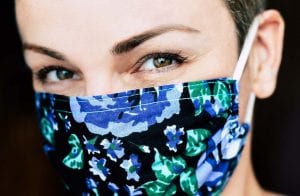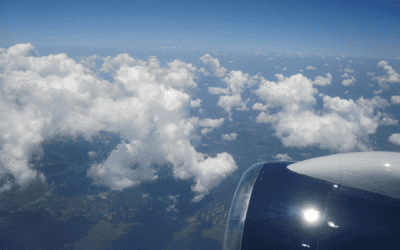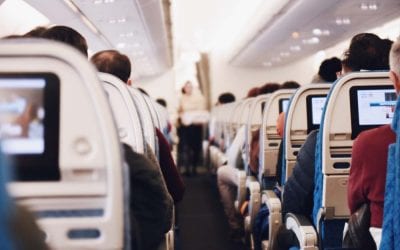More than a few airline passengers are refusing to follow face mask rules on their flights
 Earlier this month, a passenger on an American Airlines flight from New York to Dallas refused to follow AA’s face mask rules. Despite the COVID-19 pandemic, he explained that there is no law that required him to wear a face mask. He’s not alone in that belief. American removed him from the flight and banned him from future flights.
Earlier this month, a passenger on an American Airlines flight from New York to Dallas refused to follow AA’s face mask rules. Despite the COVID-19 pandemic, he explained that there is no law that required him to wear a face mask. He’s not alone in that belief. American removed him from the flight and banned him from future flights.
There’s no U.S. law requiring passengers to wear face coverings. But, there’s no law preventing airlines from legally requiring passengers to wear face masks.
Some Americans believe their Constitutional rights have no limitations. Constitution scholars tell us that isn’t true. The U.S. Constitution limits the government from suppressing rights like freedom of speech. But, it doesn’t limit private businesses in the same way. There is ample precedent for airlines and airports to unilaterally enforce reasonable safety rules. They can make regulations that they believe are necessary. And, then can set serious consequences for customers who don’t obey those rules.
Airlines have a legal responsibility to create rules and regulations to protect their passengers and employees
 An argument can be made that the airlines have a legal responsibility to create rules. These regulations protect their passengers and employees. The face mask rules may require extraordinary measures during a pandemic. Airlines must take serious action to keep passengers and crew safe from the virus. Otherwise, they could be subject to countless lawsuits by passengers and crew who contract it.
An argument can be made that the airlines have a legal responsibility to create rules. These regulations protect their passengers and employees. The face mask rules may require extraordinary measures during a pandemic. Airlines must take serious action to keep passengers and crew safe from the virus. Otherwise, they could be subject to countless lawsuits by passengers and crew who contract it.
Based on CDC recommendations and federal law, face mask rules are reasonable and legal. Passengers who don’t accept those rules will be removed from their flights and banned from future flights.
While waiting for a COVID-19 vaccine to be developed, the three available primary preventatives are hand washing, social distancing, and wearing face masks. The airlines are deep cleaning their planes daily. Passengers can use alcohol wipes while in their seats. Unfortunately, even with middle seat blocking by airlines, passengers are typically sitting within 18–20 inches of each other. It’s not possible to separate passengers by the CDC recommendation of a six-foot minimum social distance. That makes wearing face masks on planes critical for every passenger’s health.
Are airline face mask rules too absolute and abusive?
Even so, some adult passengers are upset because many of the airlines have eliminated medical exceptions, while others are angry that masks with exhaust valves, which they prefer, are banned. They consider the rules too absolute and abusive.
According to the CDC, masks with one-way valves or vents allow exhaled air to be expelled out through holes in the material and permit exhalation respiratory droplets to reach others, potentially spreading the virus. Exceptions already exist for children under two and eating and drinking. Adding more exceptions to the airline face covering rules would dramatically diminish the effectiveness of the major person-to-person transmission of COVID-19 preventative on airplanes.
On most airlines, all passengers who are age two and older are required to wear face coverings
Some parents are upset that only children less than two years of age are exempt from the face mask rules. They believe that all infants and toddlers should be exempt. But there is a significant potential problem with a blanket exception for them. A study from the Ann & Robert H. Lurie Children’s Hospital of Chicago discovered that “children younger than five years with mild to moderate COVID-19 have much higher levels of genetic material for the virus in the nose compared to older children and adults.” If confirmed, that implies that children are no less likely than adults to spread the virus.
Are there changes for rules for disabilities?
Alyssa Sadler was traveling with her three-year-old autistic son on Southwest Airlines. She was unable to have him wear a face mask. Despite a doctor’s note about her son’s condition, Southwest removed the family from the plane. Ms. Sadler thinks there should be an exception for anyone with a disability.
I fully sympathize with parents and those with disabilities, but the airlines must consider how exceptions to the face mask rules could adversely affect all passengers. Considering the contagiousness of COVID-19 and the few methods available to prevent its transmission while we wait for a vaccine, I don’t think we can legitimately say that the airlines are abusing their authority to make and enforce safety rules on their airplanes.
READ ALSO:
Are there easy ways to get passengers to fly again?
6 face-covering myths exposed as airlines ban mask deniers
Physicians and scientists have debunked the health arguments against wearing face masks
Some Americans say the health risks of wearing a mask significantly outweigh their benefits. Some contend that you can’t breathe in an adequate oxygen supply while wearing a face mask. Others feel that too much carbon dioxide builds up behind the mask, which they say is dangerous. Yet others contend that wearing a mask weakens the human immune system.
According to physicians, those allegations are false. A properly fitting mask allows plenty of oxygen through and no build-up of carbon dioxide. The American Lung Association says there’s no evidence that wearing a face mask weakens the immune system.
Based on U.S. law, and the difficulties in containing COVID-19, it seems clear that airline face mask rules are legal. They are not abusive nor risky. Moreover, wearing a face mask significantly diminishes passengers’ chances of contracting COVID-19. The virus has already killed more than 811,000 across the globe.
After many years working in corporate America as a chemical engineer, executive and eventually CFO of a multinational manufacturer, Ned founded a tech consulting company and later restarted NSL Photography, his photography business. Before entering the corporate world, Ned worked as a Public Health Engineer for the Philadelphia Department of Public Health. As a well known corporate, travel and wildlife photographer, Ned travels the world writing about travel and photography, as well as running photography workshops, seminars and photowalks. Visit Ned’s Photography Blog and Galleries.



